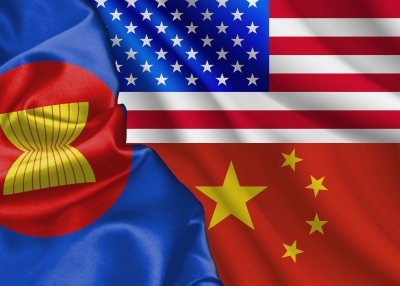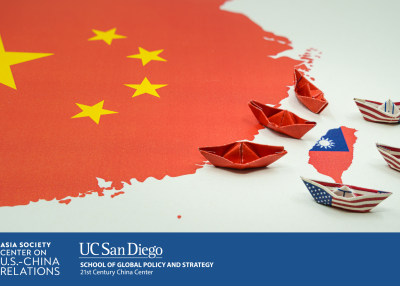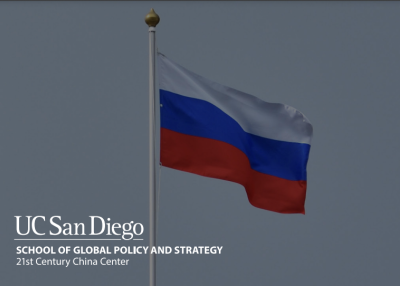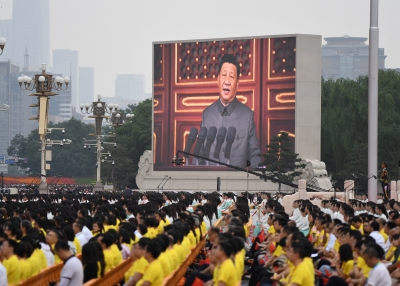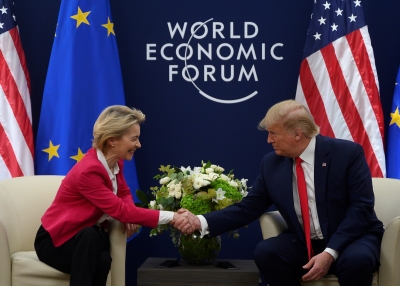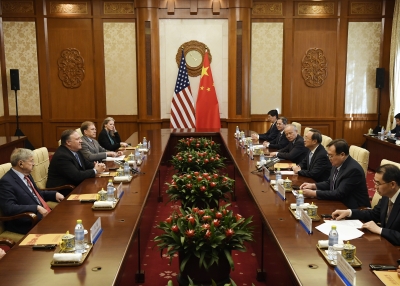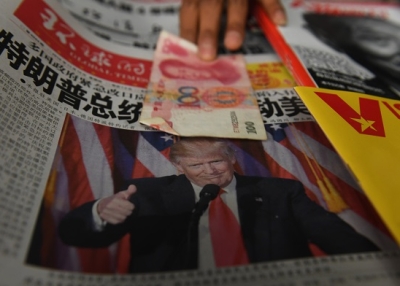The Task Force on U.S.-China Policy
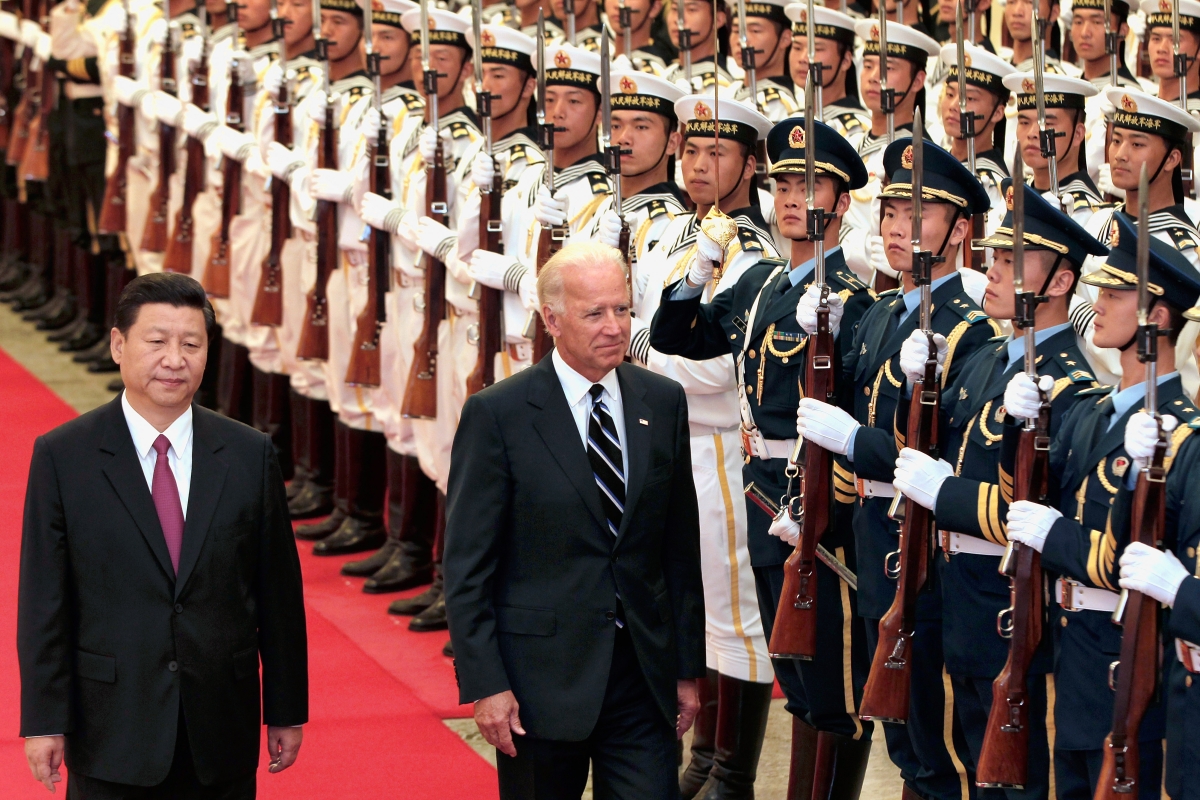
The Task Force on U.S.-China Policy is a consortium of leading China specialists who analyze and engage on issues in the U.S.-China relationship, in a non-partisan way. It is comprised of China specialists from around the United States convened by Asia Society’s Center on U.S.-China Relations and the University of California San Diego’s 21st Century China Center. Co-chaired by Orville Schell and Susan Shirk, the group includes former U.S. government officials, scholars, and think tank researchers, many of whom served under both political parties and every U.S. president since the Nixon administration.
The Task Force first set out in the fall of 2015 to reexamine the U.S.-China relationship in an increasingly uncertain time and offered up a comprehensive set of recommendations to the incoming Trump administration in its February 2017 report, U.S. Policy Toward China: Recommendations for a New Administration. This report sought to formulate a China strategy that would protect and further U.S. national interests, which it identified as a fair market-based global economic system, a peaceful and stable Asia-Pacific region, a liberal rules-based political and economic order, and a stable and productive relationship with China.
In February 2019, in response to the growing tensions in the bilateral relationship, the Task Force issued a second report entitled Course Correction: Toward an Effective and Sustainable China Policy. This memorandum focused on five issue areas:
- Economics and trade
- Regional security
- Global governance
- Human rights
- China’s influence-seeking and interference abroad
To further these interests the Task Force proposed a strategy of "smart competition." "Smart competition" involves building on American strengths to compete effectively with China while maintaining as much cooperation as possible in areas of common interest; building international coalitions to press China to follow international laws and norms; negotiating resolutions of key disputes wherever feasible; and preserving and updating those international institutions that have enhanced the welfare and security of both countries and the rest of the world for so many decades.
Building on these ideas, the Task Force’s report, China’s New Direction: Challenges and Opportunities for U.S. Policy was released in September 2021 at a time when the Biden Administration is recalibrating U.S. international priorities. China is in a greater state of flux in its domestic politics and foreign policy than in any time since the reform era began, and the report’s eight memos on key issues, such as China’s domestic politics, military, and economy, help readers understand China’s ground realities and international goals, and how the U.S. might best respond.
Task Force Statements
Hardheaded Diplomacy with China on Ukraine (March 2022)
Avoiding War over Taiwan (October 2022)
Task Force Reports
China's New Direction: Challenge and Opportunities for U.S. Policy (2021)
Course Correction: Toward and Effective and Sustainable China Policy (2019)
U.S. Policy Toward China: Recommendations for a New Administration (2017)
Working Group Reports
Prioritizing Southeast Asia in American China Policy (2023)
Silicon Triangle: The United States, Taiwan, China, and Global Semiconductor Security (2023)
Meeting the China Challenge: A New American Strategy for Technology Competition (2020)
Dealing with the Dragon: China as a Transatlantic Challenge (2020)
China's Influence & American Interests: Promoting Constructive Vigilance (2018)
About the Task Force
The Task Force on U.S.-China Policy is a project of Asia Society’s Center on U.S.-China Relations and the University of California San Diego’s 21st Century China Center.
This project is supported by the Carnegie Corporation of New York, the Henry Luce Foundation, and The Janet and Arthur Ross Foundation, with additional support from The Annenberg Foundation Trust at Sunnylands.

Task Force Participants
All participants join the Task Force in their individual, not institutional, capacities.
Co-Chairs
Orville Schell
Arthur Ross Director, Center on U.S.-China Relations, Asia Society
Orville Schell is the Arthur Ross Director of the Center on U.S.-China Relations at Asia Society. He is a former professor and Dean at the University of California, Berkeley, Graduate School of Journalism. Schell is the author of fifteen books, ten of them about China, and a contributor to numerous edited volumes, including The New Yorker, The Atlantic, The New York Times, The Nation, and The New York Review of Books. His most recent book, My Old Home: A Novel of Exile was published in 2021. Schell worked for the Ford Foundation in Indonesia, covered the war in Indochina as a journalist, and has traveled widely in China since the mid-70s.
Susan L. Shirk
Chair, 21st Century China Center, UC San Diego
Susan Shirk is Chair of the 21st Century China Center and Research Professor at the University of California, San Diego School of Global Policy and Strategy. She is also the director emeritus of the University of California's Institute on Global Conflict and Cooperation. She previously served as Deputy Assistant Secretary of State from 1997 to 2000, where she was responsible for U.S. policy toward China, Taiwan, Hong Kong, and Mongolia. Shirk founded and continues to lead the Northeast Asia Cooperation Dialogue, an unofficial forum for discussions of security issues. Her book, China: Fragile Superpower (2008), helped frame the debate on China policy in the United States and other countries. Her most recent book, Changing Media, Changing China, was published in 2010 by Oxford University Press. She is currently working on a book titled Overreach: How China's Domestic Politics Derailed its Peaceful Rise.
Participants
Charlene Barshefsky
Chair, Parkside Global Advisors
Ambassador Charlene Barshefsky is Chair of Parkside Global Advisors in Washington DC, having previously served as Senior International Partner at WilmerHale where she chaired the firm’s International Trade, Investment and Market Access Group. She previously served as the U.S. Trade Representative (USTR) from 1997 to 2001, holding the rank of Ambassador, and acting as deputy USTR from 1993 to 1996. As the USTR and a member of the president’s cabinet, she was responsible for the negotiation of hundreds of complex market access, regulatory, and investment agreements with virtually every major country in the world. Barshefsky is best known internationally as the architect and chief negotiator of China’s historic World Trade Organization agreement, as well as global agreements in financial services, telecommunications, intellectual property rights, high-technology products, and cyberspace. Her legal career in the field has encompassed international litigation, commercial negotiations, investment and regulatory advice, and dispute resolution, and she has written and lectured extensively both in the United States and abroad.
Jude Blanchette
Freeman Chair in China Studies, Center for Strategic and International Studies
Jude Blanchette currently holds the Freeman Chair in China Studies at the Center for Strategic and International Studies. He previously served as the engagement director at The Conference Board’s China Center for Economics and Business in Beijing. Prior to that he was the assistant director of the 21st Century China Center at the University of California, San Diego. Blanchette’s writing has been published by Foreign Affairs, and Foreign Policy, and his Chinese translations have been featured in the Wall Street Journal and the Financial Times. He is the author of China’s New Red Guards: The Return of Radicalism and the Rebirth of Mao Zedong, published in 2019 by Oxford University Press. Blanchette is the public intellectual fellow at the National Committee on United States-China Relations, and serves on the board of the American Mandarin Society. He is also a senior advisor at the Martin+Crumpton Group, a geopolitical risk advisory based in Arlington, Virginia. He received an M.A. in modern Chinese studies from the University of Oxford and a B.A. in economics from Loyola University in Maryland.
Sheena Chestnut Greitens
Associate Professor, Lyndon B. Johnson School of Public Affairs, University of Texas at Austin
Sheena Chestnut Greitens is an Associate Professor at the Lyndon B. Johnson School of Public Affairs at the University of Texas at Austin. She is also the director of the University’s Asia Policy Program, a joint initiative of the Clements Center for National Security and the Strauss Center for International Security & Law. She is currently a Jeane Kirkpatrick Visiting Fellow at the American Enterprise Institute, as well as an associate in research at the Fairbank Center for Chinese Studies at Harvard University. She previously served as a nonresident senior fellow in the Center for East Asian Policy Studies at Brookings. From 2015-2020, she was an assistant professor of political science at the University of Missouri, and the co-director of the University’s Institute for Korean Studies. Her research focuses on US National Security, East Asia, authoritarian politics and foreign policy. She is the author of Dictators & Their Secret Policy: Coercive Institutions & State Violence, which received multiple academic awards, and has an upcoming book titled Politics of the North Korean Diaspora.
Thomas J. Christensen
Director of the China and the World Program, Columbia University
Thomas J. Christensen is Professor of Public and International Affairs and Director of the China and the World Program at Columbia University. He arrived in 2018 from Princeton University, where he was William P. Boswell Professor of World Politics of Peace and War, Director of the Princeton-Harvard China and the World Program, and Faculty Director of the Masters of Public Policy Program and the Truman Scholars Program. From 2006 to 2008, Christensen served as Deputy Assistant Secretary of State for East Asian and Pacific Affairs, with responsibility for relations with China, Taiwan, and Mongolia.
Zack Cooper
Senior Fellow, American Enterprise Institute
Zack Cooper is a senior fellow at the American Enterprise Institute, where he studies U.S. strategy and alliances in Asia. He also co-directs the Alliance for Securing Democracy, consults for Armitage International, and teaches at Georgetown University and Princeton University. Dr. Cooper previously served as the senior fellow for Asian security at the Center for Strategic and International Studies and as a research fellow at the Center for Strategic and Budgetary Assessments. He also worked on staff at the Pentagon and White House. He holds a BA from Stanford University and an MPA, MA, and PhD from Princeton University. He is writing a book on how militaries adjust to changes in relative power, explaining how the U.S. military and its allies must adapt to meet the challenge posed by the People's Republic of China.
Robert Daly
Director of the Kissinger Institute on China and the United States, Woodrow Wilson Center
Robert Daly is Director of the Kissinger Institute on China and the United States at the Woodrow Wilson Center. He came to the Wilson Center from the China Initiative at the University of Maryland and prior to that was American Director of the Johns Hopkins University-Nanjing University Center for Chinese and American Studies. He began work in U.S.-China relations as a diplomat at the U.S. Embassy in Beijing in the late 80s and early 90s. After leaving the Foreign Service, he taught Chinese at Cornell; worked on television and theater projects in China as a host, actor, and writer; and served as interpreter for Chinese and American leaders.
Elizabeth C. Economy
Senior Advisor (for China) to the Secretary of Commerce, U.S. Department of Commerce
Elizabeth C. Economy is Senior Advisor (for China) to the Secretary of Commerce. She is on leave from Stanford University’s Hoover Institution, where she is a Senior Fellow and previously served as C.V. Starr Senior Fellow and Director for Asia Studies at the Council on Foreign Relations. She has published widely on both Chinese domestic and foreign policy. She is the author of the forthcoming The World According to China (Polity Press, 2021), as well as The Third Revolution: Xi Jinping and the New Chinese State (2018), By All Means Necessary: How China’s Resource Quest is Changing the World (with Michael Levi, 2014) and The River Runs Black: The Environmental Challenge to China’s Future (2004, 2nd ed. 2010). Economy received her PhD from the University of Michigan, AM from Stanford University, and BA from Swarthmore College.
Karl Eikenberry
Former U.S. Ambassador and Retired Lieutenant General, U.S. Army
Karl Eikenberry is a Distinguished Senior Fellow at the Stimson Center; Senior Advisor to the United States Institute of Peace; and faculty member of Schwarzman College, Tsinghua University. His almost four decades of national service culminated as the U.S. Ambassador to Afghanistan from 2009 until 2011. Before this, Ambassador Eikenberry had a thirty-five-year career in the United States Army, retiring in 2009 with the rank of lieutenant general. He has held various policy and political-military positions ranging from Deputy Chairman of the North Atlantic Treaty Organization (NATO) Military Committee in Brussels, Belgium; to Senior Country Director for China and Taiwan, Office of the Secretary of Defense; and Assistant Army and later Defense Attaché at the United States Embassy in Beijing, China. After his diplomatic and military career, Ambassador Eikenberry taught at Stanford University and later advised on Saudi Arabia's defense transformation planning.
He is a fellow of the American Academy of Arts and Sciences, serves on the boards of the Centre for Humanitarian Dialogue, The Asia Foundation, and American Councils for International Education, and is the recipient of the United States Military Academy Distinguished Graduate Award and Harvard University Centennial Medal.
M. Taylor Fravel
Arthur and Ruth Sloan Professor of Political Science and Director of the Security Studies Program, Massachusetts Institute of Technology
M. Taylor Fravel is the Arthur and Ruth Sloan Professor of Political Science and Director of the Security Studies Program at the Massachusetts Institute of Technology. In 2016, he was named an Andrew Carnegie Fellow by the Carnegie Corporation. Fravel serves on the board of directors of the National Committee on U.S.-China Relations and as the Principal Investigator for the Maritime Awareness Project. His books include Strong Borders, Secure Nation: Cooperation and Conflict in China's Territorial Disputes (Princeton University Press, 2008) and Active Defense: China's Military Strategy Since 1949 (Princeton University Press, 2019). Fravel is a graduate of Middlebury College and Stanford University, where he received his PhD. He also has graduate degrees from the London School of Economics and Oxford University, where he was a Rhodes Scholar.
Paul Gewirtz
Potter Stewart Professor of Constitutional Law and Director, Paul Tsai China Center, Yale Law School
Paul Gewirtz is the Potter Stewart Professor of Constitutional Law at Yale Law School, and the Director of Yale’s Paul Tsai China Center. He teaches and writes in various legal and policy fields, including constitutional law, the U.S. judicial system, Chinese law, and U.S. foreign policy. Yale Law School’s Paul Tsai China Center, which Professor Gewirtz founded in 1999 as The China Law Center, focuses on Chinese law and on U.S.-China relations, and is a leading institution in both fields. On leave from Yale in 1997 and 1998, Gewirtz served as Special Representative for the Presidential Rule of Law Initiative in the Clinton Administration, where he developed and led the U.S.-China initiative to cooperate in the legal field that President Clinton and China's President Jiang Zemin launched at their 1997 Summit meeting. Before joining the Yale faculty, Gewirtz served as a Law Clerk to Justice Thurgood Marshall of the United States Supreme Court. He received his BA degree summa cum laude from Columbia University and his law degree from Yale.
Bonnie Glaser
Director, Asia Program, German Marshall Fund of the United States
Bonnie S. Glaser is director of the Asia Program at the German Marshall Fund of the United States. She was previously senior adviser for Asia and the director of the China Power Project at the Center for Strategic and International Studies. Glaser is concomitantly a nonresident fellow with the Lowy Institute in Sydney, Australia, and a senior associate with the Pacific Forum. For more than three decades, she has worked at the intersection of Asia-Pacific geopolitics and U.S. policy. From 2008 to mid-2015, she was a senior adviser with the CSIS Freeman Chair in China Studies, and from 2003 to 2008, she was a senior associate in the CSIS International Security Program. Prior to joining CSIS, she served as a consultant for various U.S. government offices, including the Departments of Defense and State. She is currently a board member of the U.S. Committee of the Council for Security Cooperation in the Asia Pacific and a member of both the Council on Foreign Relations and the International Institute for Strategic Studies. She served as a member of the Defense Department’s Defense Policy Board China Panel in 1997. Glaser received her B.A. in political science from Boston University and her M.A. with concentrations in international economics and Chinese studies from the Johns Hopkins School of Advanced International Studies.
Paul Haenle
Maurice R. Greenberg Director’s Chair, Carnegie–Tsinghua Center for Global Policy
Paul Haenle holds the Maurice R. Greenberg Director’s Chair at the Carnegie–Tsinghua Center based at Tsinghua University in Beijing, China. He is also a visiting senior research fellow at the East Asia Institute at the National University of Singapore. Haenle also sits on the board of directors of the National Committee on U.S.-China Relations. Prior to joining Carnegie, he served from June 2007 to June 2009 as the director for China, Taiwan, and Mongolia Affairs on the National Security Council staffs of former presidents George W. Bush and Barack Obama. From June 2007 to January 2009, Haenle also played a key role as the White House representative to the U.S. negotiating team at the six-party-talks nuclear negotiations. From May 2004 to June 2007, he served as the executive assistant to the U.S. national security adviser. Trained as a China foreign area officer in the U.S. Army, Haenle has been assigned twice to the U.S. embassy in Beijing, served as a U.S. Army company commander during a two-year tour to the Republic of Korea, and worked in the Pentagon as an adviser on China, Taiwan, and Mongolia Affairs on the staff of the chairman of the Joint Chiefs of Staff.
Yasheng Huang
Epoch Foundation Professor of International Management, Massachusetts Institute of Technology
Yasheng Huang is the Epoch Foundation Professor of International Management and Faculty Director of Action Learning at the MIT Sloan School of Management. Between 2013 and 2017, he served as an Associate Dean in charge of MIT Sloan’s global partnership programs and its action learning initiatives. His previous appointments include faculty positions at the University of Michigan and at Harvard Business School. At MIT Sloan, Huang founded and directs China Lab and India Lab, which have provided low-cost consulting services to more than 360 small and medium enterprises in China and India. Between 2015 and 2018, he ran a program in Yunnan province to train women entrepreneurs (funded by Goldman Sachs Foundation). He has held or received prestigious fellowships, such as the National Fellowship at Stanford University and the Social Science Research Council-MacArthur Fellowship.
Arthur R. Kroeber
Head of Research, Gavekal
Arthur R. Kroeber is Head of Research at Gavekal, a financial-services firm in Hong Kong and founder of the China-focused Gavekal Dragonomics research service. Before founding Dragonomics in 2002, he spent fifteen years as a financial and economic journalist in China and South Asia. He is a Senior Non-Resident Fellow of the Brookings-Tsinghua Center, Adjunct Professor of Economics at the NYU Stern School of Business, Adjunct Professor at the Columbia University School of International and Public Affairs, and a Member of the National Committee on U.S.-China Relations. His book, China’s Economy: What Everyone Needs to Know, was published by Oxford University Press in 2016 and a revised edition will be published in late 2020.
Winston Lord
Chairman Emeritus, International Rescue Committee, Former U.S. Ambassador to China 1985-1989
Winston Lord was U.S. Ambassador to China from 1985 to 1989 under President Ronald Reagan, and served as Assistant Secretary of State for East Asian and Pacific Affairs from 1993 to 1997 under President Bill Clinton. In the 1970s, he was Special Assistant to National Security Advisor Henry Kissinger and then Director of the State Department Policy Planning staff. During this period, he was on every China trip and attended every meeting that President Nixon, President Ford, and Dr. Kissinger had with President Mao Zedong, Premier Zhou Enlai, and Deputy Premier Deng Xiaoping, and was a principal drafter of both the 1972 Shanghai Communiqué and the 1973 Paris Peace Accords. In the 1960s, Lord served in the Pentagon and the Foreign Service.
Outside of government, his service has included President of the Council on Foreign Relations, Co-Chairman of the International Rescue Committee, and Chairman of the National Endowment for Democracy. He has been a board member or advisor to many NGOs, including the Committee for Human Rights in North Korea, the Trilateral Commission, and the Women’s Tennis Association. Lord received the State Department’s Distinguished Honor Award, the Defense Department’s Outstanding Performance Award, and several honorary degrees.
Evan S. Medeiros
Penner Family Chair in Asia Studies at the School of Foreign Service, Georgetown University
Evan S. Medeiros is the Penner Family Chair in Asia Studies and the Cling Family Distinguished Fellow in US-China Studies in the School of Foreign Service at Georgetown University. His research and teaching focuses on the international politics of East Asia, U.S.-China relations, and China’s foreign and national security policies. He previously served for six years on the staff of the National Security Council as Director for China, Taiwan, and Mongolia, and then as Special Assistant to the President and Senior Director for Asia.
In recent years, Medeiros advised multinational companies on Asia in his role as Managing Director for Asia-Pacific at Eurasia Group. Prior to joining the White House, Medeiros worked for seven years as a Senior Political Scientist at the RAND Corporation. From 2007 to 2008, he also served as Policy Advisor to Secretary Hank Paulson working on the U.S.-China Strategic Economic Dialogue at the Treasury Department. Medeiros holds a PhD in international relations from the London School of Economics and Political Science, in addition to a Master of Philosophy degree in international relations from the University of Cambridge, and a master’s degree in China studies from the University of London’s School of Oriental and African Studies.
Andrew J. Nathan
Class of 1919 Professor of Political Science, Columbia University
Andrew J. Nathan is the Class of 1919 Professor of Political Science at Columbia University. He is also the chair of both the steering committee for the Center for the Study of Human Rights and the Morningside Institutional Review Board. He studies the politics and foreign policy of China, political participation and political culture in Asia, and the international human rights regime. Nathan’s books include Chinese Democracy (1985), The Tiananmen Papers (2001), China’s Search for Security(2012), and Will China Democratize? (2013). He has served at Columbia as Director of the Weatherhead East Asian Institute and as Chair of the Political Science Department. He is the regular Asia book reviewer for Foreign Affairs and a member of the editorial boards of the Journal of Contemporary China, China Information, and others. Nathan received his master’s degree in East Asian regional studies and PhD in political science, both from Harvard University.
Barry Naughton
So Kwan Lok Chair of Chinese International Affairs at the School of Global Policy and Strategy, University of California, San Diego
Barry Naughton is the So Kwan Lok Chair of Chinese International Affairs at the School of Global Policy and Strategy at University of California, San Diego. He also directs the Master of Chinese Economic and Political Affairs program, and is a member of the 21st Century China Center's curriculum committee at the University of California, San Diego. He is an authority on the Chinese economy, with an emphasis on issues relating to industry, trade, finance, and China’s transition to a market economy. He has addressed economic reform in Chinese cities, trade and trade disputes between China and the United States, and economic interactions among China, Taiwan, and Hong Kong. His books include The Chinese Economy: Transitions and Growth (2006) and Growing Out of the Plan: Chinese Economic Reform, 1978-1993 (1995), which received the Ohira Memorial Prize. Naughton received his PhD in economics from Yale University.
Daniel H. Rosen
Founding Partner, Rhodium Group
Daniel H. Rosen is a founding partner of Rhodium Group and leads the firm’s work on China, India, and Asia. Rosen has twenty-six years of professional experience analyzing China’s economy, commercial sector, and external interactions. He is widely recognized for his contributions on the U.S.-China economic relationship. He is affiliated with a number of American think tanks focused on international economics, and is an Adjunct Associate Professor at Columbia University. From 2000 to 2001, Rosen was Senior Advisor for International Economic Policy at the White House National Economic Council and National Security Council. He also serves as a board member for the National Committee of US-China Relations and is a member of the Council on Foreign Relations. Rosen graduated with distinction from the Graduate School of Foreign Service of Georgetown University (MSFS) and with honors in Asian studies and economics from the University of Texas, Austin (BA).
Daniel Russel
Vice President, International Security and Diplomacy, Asia Society Policy Institute
Daniel Russel is Vice President for International Security and Diplomacy at the Asia Society Policy Institute (ASPI). Previously he served as a Diplomat-in-Residence and Senior Fellow with ASPI for a one year term. A career member of the Senior Foreign Service at the U.S. Department of State, he most recently served as the Assistant Secretary of State for East Asian and Pacific Affairs. He served at the White House as Special Assistant to the President and National Security Council Senior Director for Asian Affairs, where he helped formulate President Obama’s strategic rebalance to the Asia Pacific region, including efforts to strengthen alliances, deepen U.S. engagement with multilateral organizations, and expand cooperation with emerging powers in the region. Among many roles at the Department of State, he served as Director of the Office of Japanese Affairs and U.S. Consul General in Osaka-Kobe.
David Shambaugh
Professor & Director of the China Policy Program at the Elliott School of International Affairs, George Washington University
David Shambaugh is the Gaston Sigur Professor of Asian Studies, Political Science and International Affairs and Director of the China Policy Program in the Elliott School of International Affairs at George Washington University. He previously served in the Department of State and on the National Security Council staff during the Carter administration (1977-1979). He then taught at the University of London’s School of Oriental & African Studies (SOAS), where he served as Editor of The China Quarterly, and he has been a member of the Board of Directors of the National Committee on U.S.-China Relations, the Council on Foreign Relations, International Institute of Strategic Studies, U.S. Asia Pacific Council, and a number of editorial boards and academic review bodies. Professor Shambaugh has published more than thirty books and numerous articles and chapters. His most recent books are China & the World (2020), The China Reader: Rising Power (2016), China’s Future (2016), China Goes Global: The Partial Power (2013); the latter two were both selected by The Economist as “Best Books of the Year.” His next book, to be published in December 2020, is Where Great Powers Meet: America & China in Southeast Asia.
Victor Shih
Associate Professor; Ho Miu Lam Chair in China and Pacific Relations, UC San Diego
Victor Shih is the Ho Miu Lam Chair in China and Pacific Relations and associate professor of political science at the University of California, San Diego School of Global Policy and Strategy. He is an expert on the politics of Chinese banking policies, fiscal policies, and exchange rate, as well as the elite politics of China. Shih is the author of two books published by the Cambridge University Press, Factions and Finance in China: Elite Conflict and Inflation and Coalitions of the Weak: Elite Politics in China from Mao’s Stratagem to the Rise of Xi. He is also editor of Economic Shocks and Authoritarian Stability: Duration, Institutions and Financial Conditions, published by the University of Michigan Press. He is the author of numerous articles appearing in academic and business journals, including the American Political Science Review, China Quarterly, Comparative Political Studies, Journal of Politics, Wall Street Journal, and China Business Review, and he is a frequent adviser to the financial community.
Jessica Chen Weiss
Professor of Government, Cornell University
Jessica Chen Weiss is a political scientist and professor of government at Cornell University. While on sabbatical from Cornell, she served as Senior Advisor to the Secretary's policy planning staff at the U.S. Department of State as a Council on Foreign Relations International Affairs Fellow for Tenured IR Scholars (IAF-TIRS). She was previously a political science editor at the Washington Post Monkey Cage blog, and a nonresident Senior Associate at the Center for Strategic and International Studies. Weiss is the author of Powerful Patriots: Nationalist Protest in China’s Foreign Relations (Oxford University Press, 2014). Her research appears in International Organization, China Quarterly, International Studies Quarterly, Journal of Conflict Resolution, Security Studies, Journal of Contemporary China, and Review of International Political Economy, as well as in the New York Times, Foreign Affairs, and Washington Quarterly. Weiss was an assistant professor at Yale University (2009-2015) and founded FACES, the Forum for American/Chinese Exchange at Stanford, while an undergraduate at Stanford University. Born and raised in Seattle, Washington, she received her PhD from the University of California, San Diego in 2008, where her dissertation won the 2009 American Political Science Association Award for best dissertation in international relations, law and politics. Weiss is a term member of the Council on Foreign Relations.
Rana Mitter
S.T. Lee Professor of U.S.-Asia Relations
Rana Mitter is ST Lee Chair in US-Asia Relations at the Harvard Kennedy School. He is the author of several books, including Forgotten Ally: China’s World War II (2013) which won the 2014 RUSI/Duke of Westminster’s Medal for Military Literature, and was named a Book of the Year in the Financial Times and The Economist. His latest book is China’s Good War: How World War II is Shaping a New Nationalism (Harvard, 2020). His writing on contemporary China has appeared recently in Foreign Affairs, the Harvard Business Review, The Spectator, The Critic, and The Guardian. He has commented regularly on China in media and forums around the world, including at the World Economic Forum at Davos. His recent documentary on contemporary Chinese politics "Meanwhile in Beijing" is available on BBC Sounds. He is co-author, with Sophia Gaston, of the report “Conceptualizing a UK-China Engagement Strategy” (British Foreign Policy Group, 2020). He won the 2020 Medlicott Medal for Service to History, awarded by the UK Historical Association. He previously taught at the University of Oxford, and is a Fellow of the British Academy.
Rick Waters
Managing Director, China, Eurasia Group
Rick Waters is the managing director of Eurasia Group's China practice. Drawing on his decades of experience in the US foreign service, Rick leads the firm's China expertise and client offerings. His research interests include China's global and regional diplomacy, US-China relations, and China's domestic political economy. Rick joined Eurasia Group after a 27-year career as the US State Department's top China policy official, overseeing the creation of the Office of China Coordination, informally known as the China House, and concurrently serving as deputy assistant secretary of state for China and Taiwan. Rick also held multiple roles at the US embassy in Beijing—including during the period between the accidental US bombing of the Chinese embassy in Belgrade in 1999 and the Hainan Island incident in 2001. Fluent in Mandarin and Spanish, Rick also speaks Arabic and worked for more than a decade on Middle East issues, including as director for Israel, Palestine, Egypt, and Jordan at the National Security Council under George W. Bush and as political counselor in Jerusalem and Islamabad. A graduate of Georgetown University's Walsh School of Foreign Service, Rick is based in Eurasia Group's Washington, DC, office.
Former Participants
Kurt M. Campbell
Co-Founder and Former Chief Executive Officer, The Asia Group, LLC
Kurt M. Campbell was a member of the Task Force on U.S.-China Policy. He resigned from the Task Force on January 24, 2021 and subsequently assumed the role of Deputy Assistant to the President and Coordinator for Indo-Pacific Affairs on the National Security Council. Previously, he was the CEO of The Asia Group. Campbell was also the co-founder of the Center for a New American Security.
From 2009 to 2013, Campbell served as the Assistant Secretary of State for East Asian and Pacific Affairs, where he is widely credited as being a key architect of the “pivot to Asia.” For advancing a comprehensive U.S. strategy, Secretary Hillary Clinton awarded him the Secretary of State’s Distinguished Service Award (2013). He is the author or editor of ten books, most recently The Pivot: The Future of American Statecraft in Asia (2016). Campbell received his doctorate in international relations from Brasenose College at Oxford University, where he was a Marshall Scholar.
Melanie Hart
Former Senior Fellow and Director of China Policy, Center for American Progress
Melanie Hart served as senior fellow and director for China policy at the Center for American Progress (CAP), a think tank based in Washington, DC. In 2021, she resigned from the Task Force on U.S.-China Policy and joined the Biden-Harris Administration. Her most recent work focuses on developing a comprehensive U.S. strategy on China, mapping China’s global governance ambitions, and tracking Chinese industrial policies in the energy and information and communication technology sectors. Before joining CAP, Hart worked as a China market and policy analyst for a leading U.S. telecommunications firm, for the Aspen Institute International Digital Economic Accords Project, and for other business and policy institutions. Hart has a PhD in political science from the University of California, San Diego, and a BA from Texas A&M University. She currently serves on the board of the American Mandarin Society, a nonprofit organization dedicated to supporting the professional development of current and future stewards of the U.S.-China relationship.
